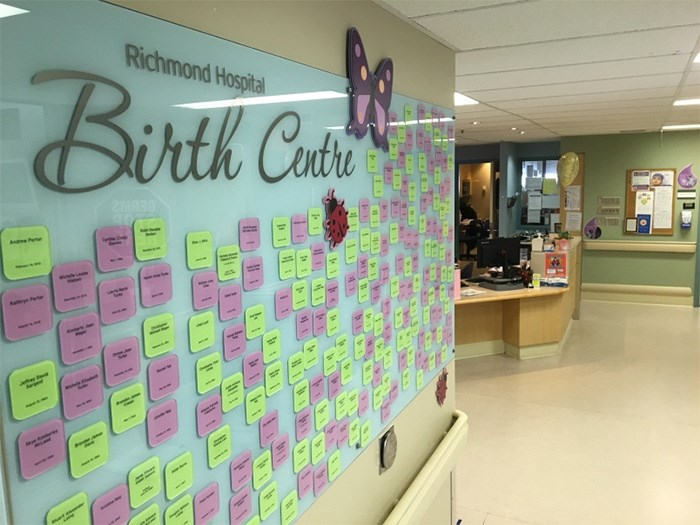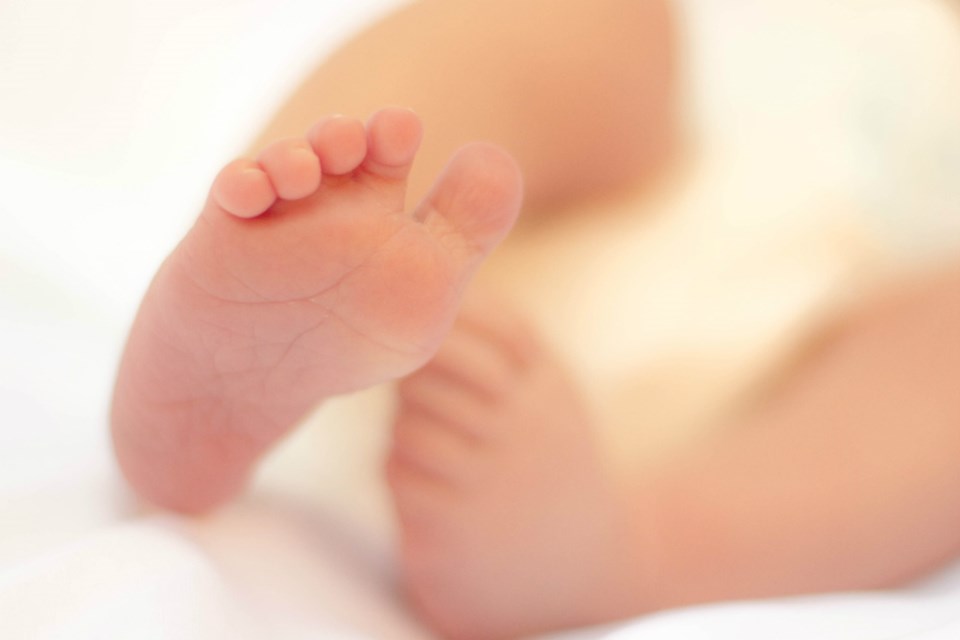While a broiling diplomatic row between China and Canada is ruffling commodities trading, it has yet to have an impact on birth tourism in B.C.
The prevalence of births from foreign, non-resident mothers in B.C. hospitals this year is holding steady from last year’s record pace, according to new data provided to Glacier Media by local health authorities.
Vancouver Coastal Health, the government agency managing Richmond Hospital, is reporting births from non-residents of Canada for 2018-19 to date are slightly below the record-setting pace of 469 in 2018-18.
 Richmond Hospital birth centre. Photo by Graeme Wood
Richmond Hospital birth centre. Photo by Graeme Wood
From April 1, 2018, to Feb. 7, 2019, there have been 389 births classified as “self pay other country resident.”
So, Richmond Hospital is set to deliver 453 newborns to March 31 (end of the financial year) from foreign mothers.
Since Dec. 18, just weeks after Huawei CFO Meng Wanzhou’s Dec. 5 arrest set in motion a diplomatic crisis, the pace of such births in Richmond has actually increased compared with the preceding eight months (from 1.24 births per day to 1.33 per day).
Meanwhile Vancouver’s St. Paul’s Hospital, the B.C. hospital with the second highest number of non-residents of Canada giving birth, is on pace for 134 births this year to March 31, up slightly from 132 in 2017-18.
Last year (2017-18) the provincial government reported 837 births to non-B.C. residents, up from 676 the year prior.
Richmond is the epicenter for international birth tourism businesses, which offer visa services, immigration advice, short-term accommodations, day-to-day services and even some healthcare advice to pregnant foreigners who seek Canadian citizenship for their newborns. Nationality isn’t routinely tracked, but a tabulation by hospital officials in 2016 showed Chinese nationals accounting for 98% of births to non-residents of Canada.
Richmond Hospital delivered more babies from foreign, non-resident mothers than any other Canadian hospital last year, according to the Institute for Research on Public Policy (Policy Options). Policy Options’ data is based on discharge information from the Canadian Institute for Health Information.
Births in Canada defined as “other country resident self-pay” increased 168% between 2010 and 2017 (from 1,354 to 3,628), Policy Options reported.
However, those figures include data from provinces where international students are not covered by public health insurance, so the totals are higher than for birth tourism alone. Meanwhile, in B.C. over 134,000 international students – plus their dependents – are enrolled in the public system. So Richmond Hospital’s figures are more likely to capture explicit instances of birth tourism—and they do not capture instances of international students or their dependents planning to have children while studying or living in Canada.
Specific provincial data on birth tourism has been difficult to obtain, but the provincial government has started counting the number of non-residents of B.C. who are paying for births. This is more accurate than when officials, including at Statistics Canada, once only collected listed addresses on hospital forms, which would encompass the pregnant woman’s “baby” or “birthing” house, or “maternity hotel,” whose numbers are in the dozens across the Lower Mainland, according to provincial officials in 2015.
 Newborn baby/Pexels
Newborn baby/Pexels
Data collection is among one of the key goals of a federal review of birth tourism sparked by petitioner and Richmond resident Kerry Starchuk.
The Parliament of Canada petition denounces birth tourism as “an abusive and exploitative practice . . . whereby expectant mothers who are foreign nationals, with no status in Canada, gain automatic citizenship for their children born in Canada.”
It claims birth tourism, which is technically legal, is “debasing the value of Canadian citizenship” and is prone to abusing Canada’s social security programs.
Steveston-Richmond East Liberal MP Joe Peschisolido, who supported the petition, said Minister of Immigration, Refugees and Citizenship Ahmed Hussen is weeks away from tabling recommendations to curb the practice.
Peschisolido said Wednesday the problem can’t be solved by ending birthright citizenship (also known as jus soli rights), as was initially proposed in a previous petition by Richmond Centre Conservative MP Alice Wong that wasn’t accepted by the Liberal government.
A poll from Research Co. in February showed almost three in four (73%) believe it is time to end automatic citizenship for people born in Canada (adopting rules used by most Western countries). An Angus Reid poll in March showed 60% of Canadians want the law changed.
The United States also has jus soli rights, but federal officials have recently began to crack down on baby houses in southern California. In February, three people were charged with conspiracy to commit immigration fraud, international money laundering and identity theft, according to CNN.
In the U.S., the right is enshrined in the constitution, unlike in Canada.
Peschisolido said municipalities and the provincial government need to address grey areas surrounding healthcare delivery and zoning to make birth tourism businesses more difficult to operate; however, he offered no specific solutions and said he hasn’t spoken to his provincial counterparts.
“I don’t want to prejudge what the Minister of Immigration should do,” said Peschisolido. “I will leave that for them to figure out.
“My view is it’s an issue that impacts all levels of government.”
Health Minister Adrian Dix declined several requests from Glacier Media to comment on the matter, but he told the Vancouver Sun in May that it was a federal matter related to immigration and visa entries.
Online advertisements in Chinese show these businesses provide services such as cooking, but also offer care that falls under what a registered doula or nurse would do, such as lactation assistance.
“There are certainly concerns about patient safety, workload and access to healthcare,” B.C. Nurses Union acting president Christine Sorensen told Glacier Media in October 2017. Sorensen was unavailable for comment on this story.
City of Richmond Mayor Malcolm Brodie publicly stated during the civic election period last November he opposes the practice.
The city has had no correspondence with senior levels of government on the matter between Jan.1, 2018, to Dec. 31, 2018, based on a freedom of information request filed by Glacier Media earlier this year.
The city has maintained that it can enforce accommodation-related bylaws and business licensing.


